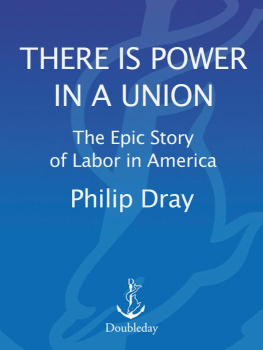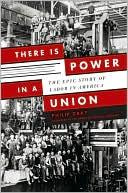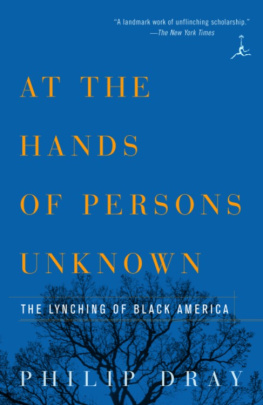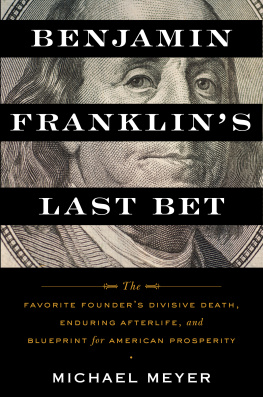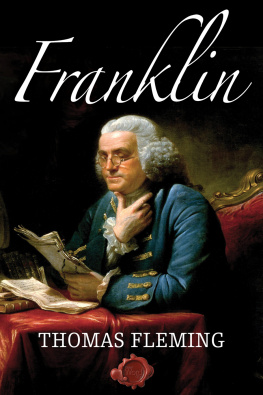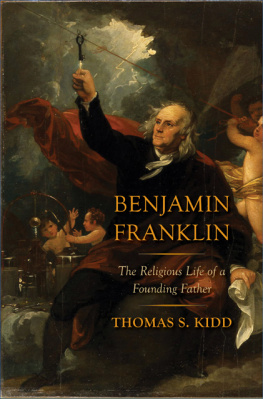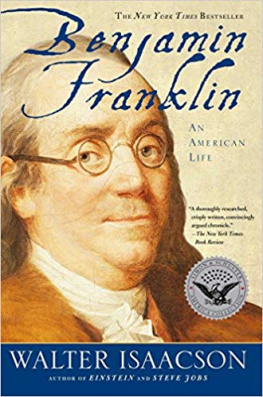
CONTENTS
Chapter 1
COTTON MATHER, DAM YOU, WITH A POX TO YOU
Chapter 2
MADE AT PHILADELPHIA
Chapter 3
A SUBJECT OF SERENE CONTEMPLATION
Chapter 4
THE MIGHTY HAND OF GOD
Chapter 5
ELECTRIC AMBASSADOR
Chapter 6
THE SCIENCE OF FREEDOM
In the Affairs of this World,
Men are saved,
not by Faith,
but by the Want of it.
POOR RICHARDS ALMANAC, 1754
INTRODUCTION
ONE DAY IN APRIL 1755, BENJAMIN FRANKLIN WAS RIDING ON A country lane in Maryland with his son, William, and some other gentlemen, when he suddenly saw in the valley below a small whirlwind beginning in the road, and showing itself by the dust it raised. Franklin spurred his horse as the whirlwindat its base no larger than a barrel, but as much as thirty feet wide at the topapproached the group. The rest of the company stood looking after it, but my curiosity being stronger, I followed it, riding close by its side.... As it is a common opinion that a shot, fired through a water-spout, will break it, I tried to break this little whirlwind, by striking my whip frequently through it, but without any effect.
Franklin chased the whirlwind into a wooded area, where it began picking up leaves. I accompanied it about three quarters of a mile, till some limbs of dead trees, broken off by the whirl, flying about and falling near me, made me more apprehensive of danger; and then I stopped, looking at the top of it as it went on, which was visible, by means of the leaves contained in it, for a very great height above the trees. Franklin rode back to join his companions, who had halted in the road to enjoy watching his pursuit. Upon my asking Colonel Tasker if such whirlwinds were common in Maryland, he answered pleasantly: No, not at all common; but we got this on purpose to treat Mr. Franklin.
The rest of the company stood looking after it, but my curiosity being stronger, I followed it, riding close by its side. This comment can function, suggests biographer Carl Van Doren, as a declaration of Franklins scientific philosophy: where most people gave, at best, only passing thought to unexplained natural phenomena, Franklin was endlessly intrigued. Whirlwinds and waterspouts, storms, the principles of heat and ventilation, oils calming effect on water, the mysterious Gulf Stream, electricity that enters and leaves its temporary homes, always returning to itself unalteredthese were among the subtle actions of nature for which he maintained a lifelong fascination, from his boyhood experiments with swimming palettes in a Boston mill pond to his delight, decades later as a statesman in Paris, in the novelty of balloon flight.
Franklins success, as a diplomat and one of our nations founders, is often credited to his supreme coolhis ability to remain above the fray, to act in the broad interest of conciliation, to say only what was helpful or required and no more. Science was always a different story. With its indifference to sentiment and its insistence on observable fact, it was for Franklin an ideal foil. Nature alone met him on equal terms, historian Carl Becker has said, with a disinterestedness matching his own....
Of course, in an age when so much remained unknown about the workings of the physical world, prying into natures secrets could be risky. In December 1750, Franklin had invited some friends to his Philadelphia home to help him slaughter a turkey by electrocution for Christmas dinner, using a charge from two Leyden jars. An experienced printer, Franklin had powerful hands and was extremely dexterous. But, in this instance, allowing himself to be distracted by his guests, and not minding for a moment what surfaces he was touching, he inadvertently took [the stored electricity] through my own arms and body, by receiving the fire from the united top wires with one hand while the other held a chain connected with the outsides of both jars. The company present... say that the flash was very great and the crack as loud as a pistol. I then felt what I know not well how to describe: a universal blow throughout my whole body from head to foot, which seemed within as well as without. One of Franklins hands, feeling like dead flesh, instantly turned white, as if all the blood had been driven out. He may have had this experience in mind when he later speculated, a bit navely, that the effect of being struck by a lightning bolt might be approximated by wiring up several Leyden jars.
Even so near a brush with death did not inhibit his interest in electrical experiments or diminish his essential optimism. We learn by chess, observed Franklin, a dedicated player of the game, the habit of not being discouraged by present appearances in the state of our affairs, the habit of hoping for a favorable change, and that of persevering in the search for resources.
Franklins inquisitiveness about nature was matched by his disdain for the continual upheaval he found in human society. Much of his life, as a printer, publisher, and inventor, as a civic leader, and as a statesman, was spent trying to replace chaos with ordercreating a program to keep the streets clean, a volunteer fire department, a young mens improvement society, a lending library, a plan to ally the American colonies. It was probably a union of these two impulseshis interest in investigating that which had not yet been adequately explained, and the urge to fix what could bear improvementthat drew his attention initially to the phenomena of thunder and lightning and led to his greatest invention, the lightning rod.
Thunderstorms inflamd my Curiosity, he once said. Representing nature on a vast scale and at its most frightening and enigmatic, storms became a particular subject of interest to Franklin during his early years in Philadelphia in the 1730s, when he was publisher of the Pennsylvania Gazette and was beginning his public life. Little or nothing was known about lightning, whose true nature was then shrouded by centuries of superstition. When, in summer, lightning flickered over the New Jersey shore of the Delaware River, Franklin paused to watch its zigzag path across the sky. He took note of the manner in which it destroyed trees and chimneys, and calculated its downward course to the ground from the tops of church steeples. He filled the Gazette with accounts of the mischief of thunder-gusts, and laterto the dismay of his wife, Deborahrigged an apparatus that would bring lightning into their house and announce its arrival by tinkling some bells on the stairway landing.
[On] Tuesday last the House of Mr. James Rogers was struck by Lightning, Franklin reported in his paper on July 10, 1732.
It split down Part of the Chimney, went through the Room where he was sitting with his Children, but without hurting any of them; and entring into the Cellar, fird a full Hogshead of Rum which stood under an Arch, and bursting out the Head, the whole Cellar was instantly filld with Flames which pourd out at the Windows. There was several hundred weight of Butter in Tubs, which melted and took fire also.... After the Fire was out, it was so hot as not to be tolerable to the Feet and Legs of those who would have gone in.
But mischief could also connote more dire effects:
From Newcastle we hear that on Tuesday the 8th instant, the lightning fell upon a house within a few miles of that place, in which it killed 3 dogs, struck several persons deaf, and split a womans nose in a surprizing manner.
Next page

